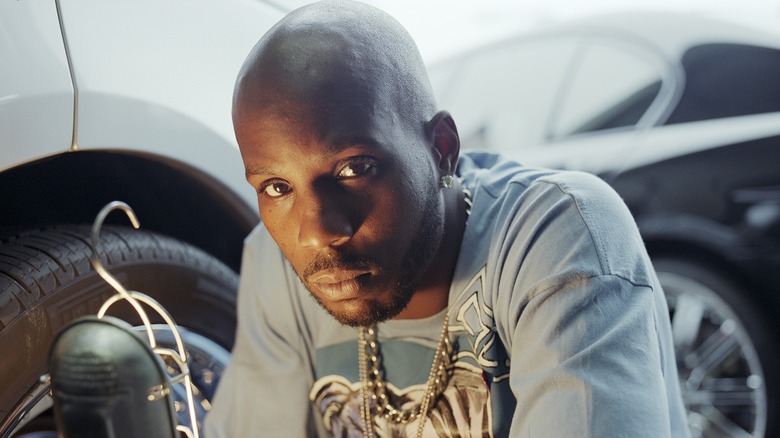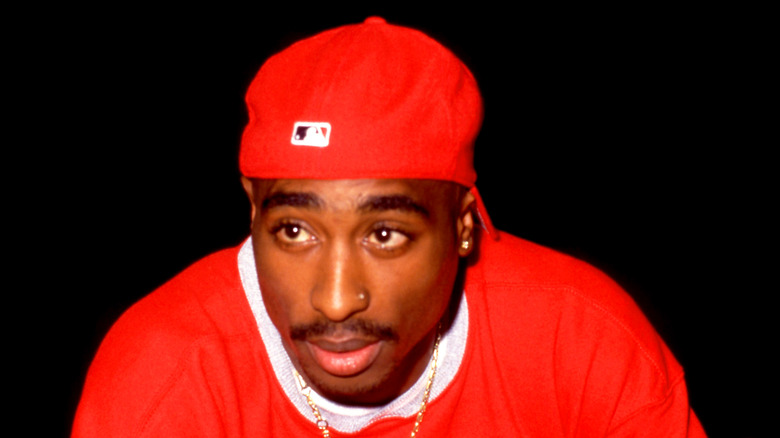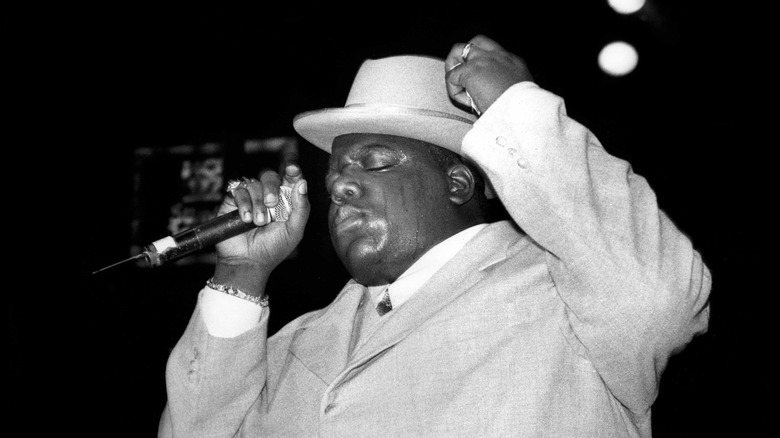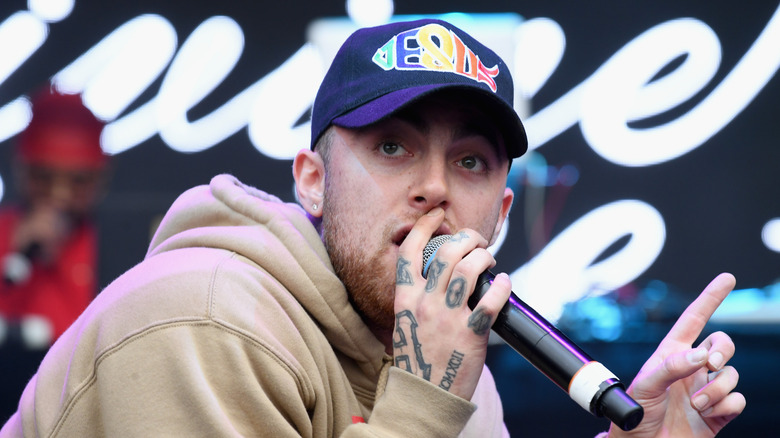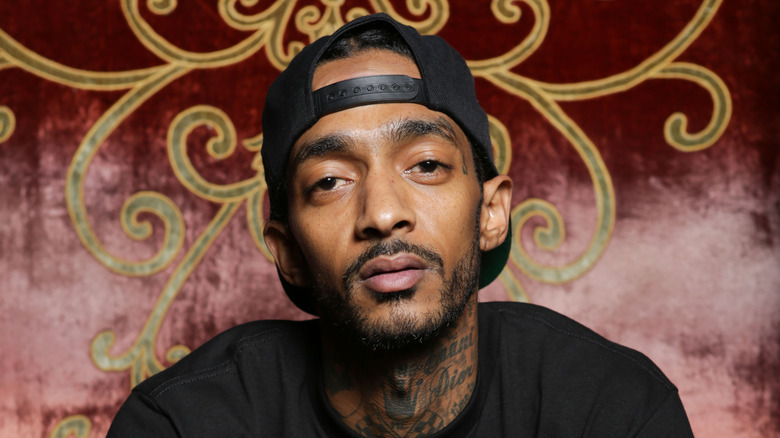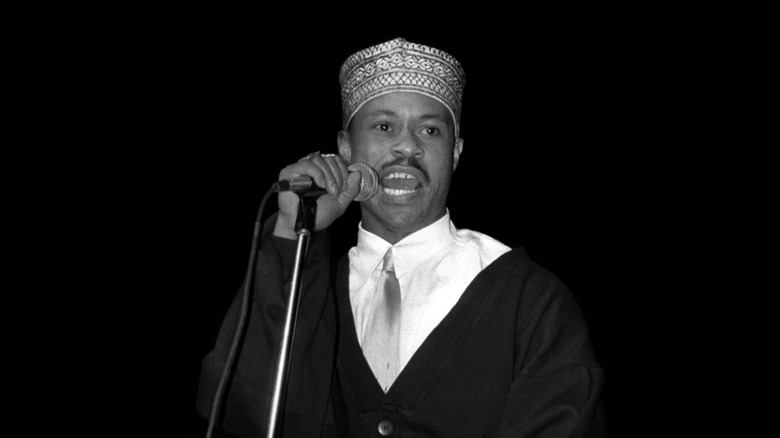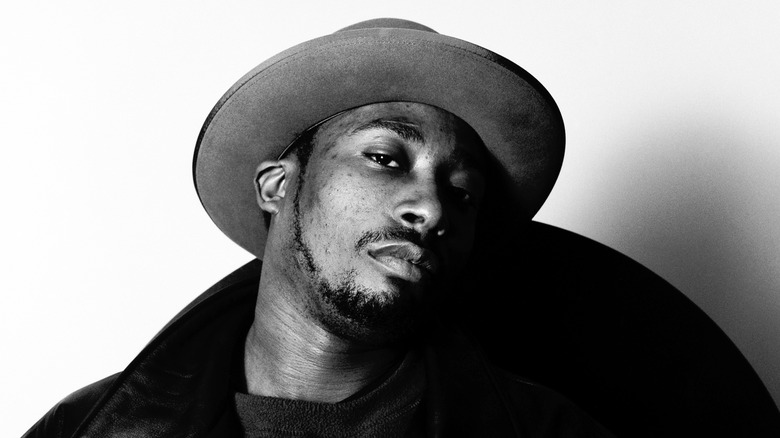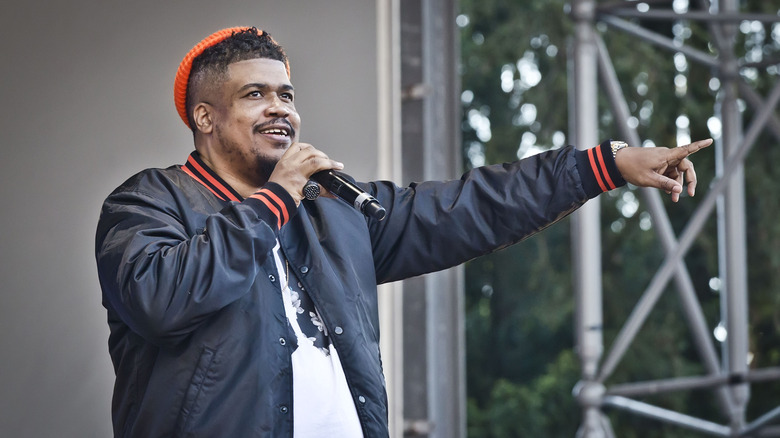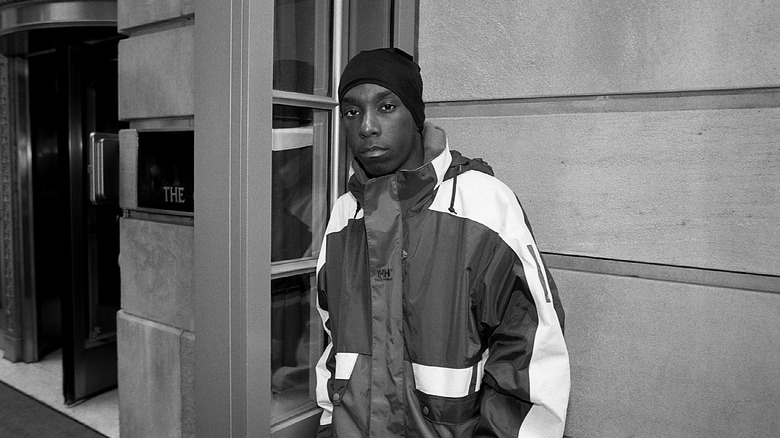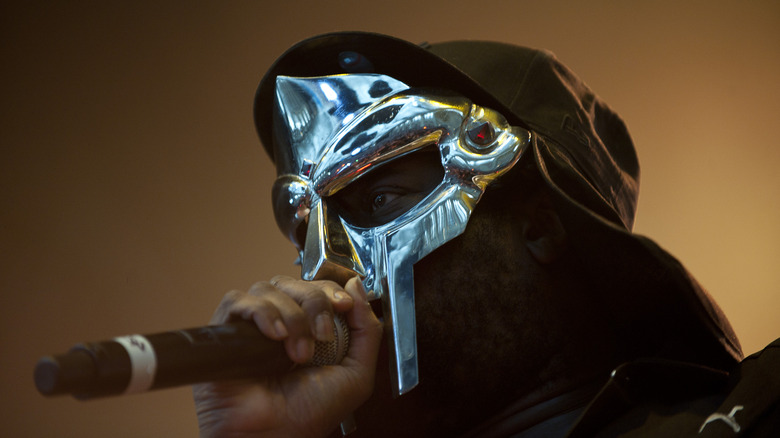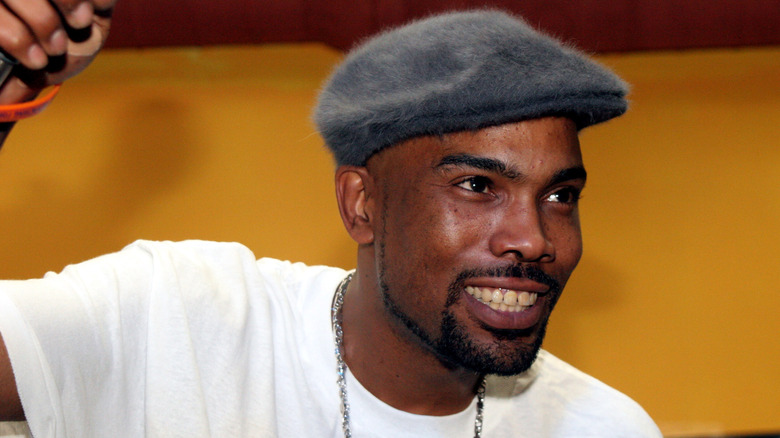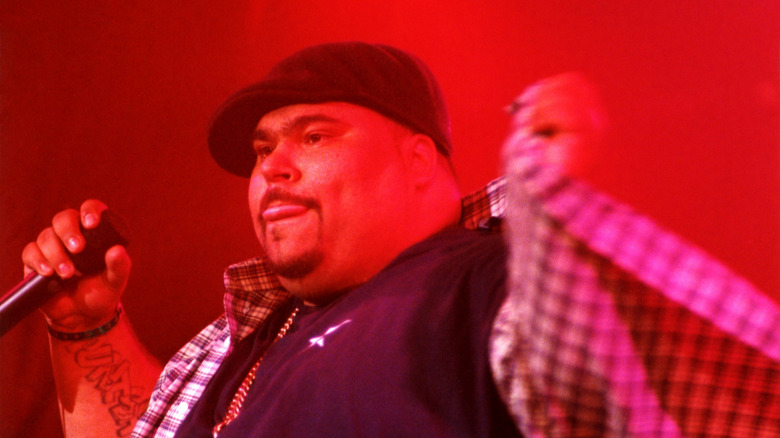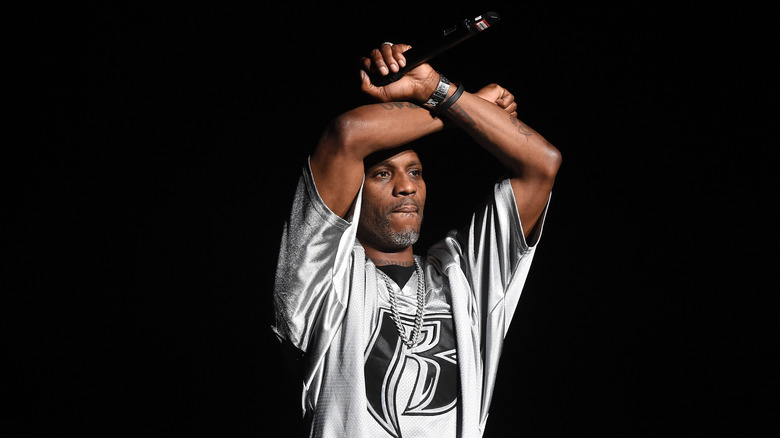Things We Learned About Rappers After They Died
Back in the heyday of rock music, it was believed that being a rock star was one of the most dangerous careers a person could choose. So many stars were dying before their time that the concept of the "27 Club" emerged, memorializing the scores of rock stars who all died at age 27. In recent decades, however, we have seen that rock isn't the only genre of music that seems to court death, with far too many rappers also dying young.
Rapper and academic A.D. Carson addressed in The Conversation the prevalence of untimely and tragic death among rappers, citing the wide array of causes that have befallen some of the hip-hop genre's most admired stars. He explains how, while gun violence has become closely associated with the culture following several high-profile killings, such deaths are a symptom of a "plague of gun violence" enveloping the nation as a whole. He notes that cancer, heart disease, addiction, and other illnesses have also taken the lives of countless rappers before they reach retirement age.
Music fans often sanctify those artists who die before their time, and with interest in those lost often reaching fever pitch in the months and years after an artist's death, they are often confronted with startling new facts about their lives and deaths. Here are some of hip-hop's most compelling posthumous revelations.
Tupac's alleged murderer was finally indicted by a grand jury
The murder of Death Row Records rapper Tupac Shakur sent shockwaves through the world of hip-hop, and represented the climax of the notorious East-West coastal feud which had engulfed rap culture during the mid-1990s.
On September 7, 1996, Shakur was in Las Vegas, Nevada, where, alongside his label boss Suge Knight and their entourage, he watched Mike Tyson beat Bruce Seldon for the heavyweight boxing title. After the fight, the rapper and his companions got into an altercation with a group of South Side gangsters, who had previously attacked a friend of Knight's and tried to steal a Dream Row chain and medallion. Security footage shows Shakur and Knight repeatedly kicking a man named Orlando Anderson as he lay on the floor. Hours later, the pair were driving in Knight's black BMW when a Cadillac pulled up beside them and fired twelve or more shots into the car, injuring Knight, who was driving, and fatally wounding Shakur, who died six days later at the University Medical Center.
It took 27 years for the identity of Shakur's alleged killer to come to light. In 2023, Duane Davis, a former gangster and the uncle of Anderson, was indicted following several media appearances in which he confirmed his involvement in supplying the murder weapon and claimed his nephew pulled the trigger. According to Davis, the killing was more than just simple revenge, claiming that a bounty of $1 million had been put on the heads of Shakur and Knight by Sean "Diddy" Combs, their East Coast rival.
Biggie's long-delayed autopsy report revealed his health issues
The murder of Notorious B.I.G, born Christopher Wallace, has also been shrouded in mystery since his killing on March 9, 1997. The East Coast MC was formerly a friend of Tupac Shakur, but things soured between the pair after Shakur was shot and mugged on his way to meet Wallace at a Manhattan studio. Because of the timing of the attack, Shakur came to believe that Wallace was somehow involved, though the latter denied any knowledge that the attack was going to take place.
Wallace was shot to death in a drive-by attack after a party in Los Angeles. Like Shakur, he was shot while sitting in the passenger seat of a car, with four bullets entering his body after another vehicle opened fire. Surprisingly, it took 15 years for the details of the attack to be made public, with the delayed release of Wallace's autopsy report only arriving in 2012. The autopsy revealed that, despite being at a party, Wallace was entirely sober at the time of the shooting, and contained the grisly detail that one bullet struck several major organs, including his heart.
The autopsy highlights Wallace's high weight and lists several health issues. Most notable among the findings was that Wallace had heart disease, including cardiomegaly and biventricular hypertrophy, both of which are potentially serious. He was just 24 years old, and his murder remains unsolved.
Mac Miller was productive and happy before his death
Mac Miller was considered one of hip-hop's most exciting young talents before his tragic death on September 7, 2018, caused by an accidental drug overdose. The 26-year-old had long dealt with addiction, an aspect of his life he discussed openly in his music. His personal assistant, who made the emergency call after discovering Miller had overdosed, also served as his sobriety coach.
When the tragic news of Miller's death broke, some gossip outlets speculated that his fatal drug misuse may have been linked to his public break-up with pop superstar Ariana Grande, which occurred shortly before he was arrested on DUI and hit-and-run charges. Altogether, these events suggested to some that the rapper's life was spiraling out of control.
However, those close to Miller have since indicated that his final months were happy ones, in which he spent time with friends and was focused on preparing to go on tour in support of his latest album, "Swimming." Thundercat, a close friend and collaborator of Miller's, recalled that the rapper had made a big effort to celebrate the birthday of Thundercat's daughter, Sanaa. "The happiness was there, man ... I could see it in him. And it wasn't fake," Thundercat later told Rolling Stone.
Nipsey Hussle's community work
By the age of 33, South Los Angeles rapper Nipsey Hussle had established himself as an underground veteran. He had more than a dozen mixtapes to his name as well as his first major label studio album, "Victory Lap," which hit the Billboard 200 top five in 2018 and earned him a Grammy nomination. He was also an inspirational entrepreneur, whose business acumen helped him found a STEM center named Vector 90 to foster young talent in his home district of Crenshaw. The project garnered major media coverage, and showed that Hussle's career was about more than self-interest.
Sadly, Hussle was shot and killed outside his closing store on March 31, 2019, leaving those who knew him in the local community distraught. But what Hussle's wider fanbase didn't know was how much he focused his energy into his local area, an aspect of his life that came to the fore as the posthumous tributes flowed. In the wake of Hussle's murder, details of his immense generosity and activism spread throughout the world's media, including his buying shoes for every student at a Hyde Park elementary school, and his contributions to the funerals of local people lost to gun violence. "He did so much for our neighborhood," one local told the Los Angeles Times.
Guru's last wishes were disputed
Guru's influence as a rapper was immense. As one half of Gang Starr — alongside DJ Premier — he created some of the most enduring hip-hop of the late '80s, '90s, and '00s, all whilst looking to expand the boundaries of the genre with his acclaimed "Jazzmatazz" series. His voice was smooth and hypnotic, and one of the most instantly recognizable in rap. But when news broke in April 2010 that Guru had died at the age of 48 — originally reported as 43 – details were sketchy.
The news came through a statement released by Solar, Guru's longtime producer, though Solar claimed the words were Guru's. In it, the rapper seemingly stated: "I have had a long battle with cancer and have succumbed to the disease. I have suffered with this illness for over a year. I have exhausted all medical options." He then went on to entrust Solar with caring for his son and to accept "awards and tributes" on his behalf. The statement claimed that he did not want Premier, with whom he made his name, "anything to do with my name likeness, events tributes etc." (via NME).
But neither Guru's family nor his fans were convinced that the strange posthumous message was genuine, particularly as it came after allegations that Solar had prevented Guru's family from seeing the rapper in the months before his death, when he had fallen into a coma. Musician ?uestlove of The Roots took to social media to claim that the statement was a forgery.
ODB's mental health issues
The Wu-Tang Clan changed the face of hip-hop in the early 1990s, with raw martial arts-infused beats and memorable rhymes that essentially created a dynasty that is still going strong today. Much of the appeal of the group was the charisma of the Clan's original nine members, including Ol' Dirty B******, aka ODB, who brought a new and unpredictable flow to his verses, and proved himself to be the wildest of the group on the mic.
But ODB's wild side also spilled out into his personal life, and was arrested countless times during the 1990s. He also spent a month as a fugitive after fleeing a court-ordered rehab center, during which he was treated as something of a Robin Hood figure after making public appearances with the Clan before escaping from police officers. Two lengthy prison spells disrupted his career, and his constant, heavy drug misuse was well known. Sadly, he died of an overdose in a New York recording studio on November 13, 2004, at the age of 35.
It later transpired that ODB was dealing with serious mental health issues which may have been exacerbated by his time in prison. Biographer Jaime Lowe, author of "Digging for Dirt," later spoke to ODB's mother, who described him as a "working paranoid schizophrenic." The rapper allegedly preferred to perpetuate the belief that his erratic behavior was the result of addiction rather than mental health issues, and that he had been heavily medicated during his final months.
Trugoy the Dove was trying to improve his health
De La Soul has remained one of the most respected groups in hip-hop throughout their decades-long career. Pioneers of collage-like sampling techniques and playful rhymes with complex rhyme schemes on their acclaimed 1989 debut "3 Feet High and Rising," the trio's impact was indelible despite legal issues around their use of samples. The majority of their discography was missing from streaming services until 2023, when it was finally made available to great fanfare in the hip-hop community. Sadly, De La's arrival on streaming was tempered by the tragic news that David Jolicoeur, who was known in the trio as Trugoy the Dove — or simply Dave in later years — had died on February 12 of that year at the age of 54.
The death came after years of congestive heart failure, which he discussed publicly. However, it was only after Jolicoeur's death that his bandmates opened up about how much his health affected his career and made him unable to perform. In a June 2023 interview, rapper Posdnuos and DJ Maseo revealed that Jolicoeur would become exhausted after performing a single song, prompting the rapper to assure his bandmates that he would make a greater effort to follow his health regimen. Sadly, he never got the chance.
Cam'ron's shocking claim about Big L's murder
For many old school hip-hop heads, the name Big L is up there among the greats. The New York rapper attracted a huge underground following before breaking into the industry in 1995, with the release of his acclaimed solo LP "Lifestylez Of Da Poor & Dangerous." A noted freestyler, he was known for his lyrical dexterity and raw authenticity. He was also the mentor of a young Jay-Z, and Nas said Big L was the rival he was most scared of.
Big L's legend grew even bigger at the end of the decade, following the shocking news that he had been shot and killed on February 15, 1999, not far from his home in Harlem. At the time, police detectives shared a theory (via Rolling Stone) that Big L's death may have been "retaliation for something [Big L's] brother did," and arrested a childhood friend of Big L's named Gerard Woodley, though he was later released.
Woodley himself was murdered in June 2016. A month later, rapper Cam'ron, who was a friend of Big L's and also attended Woodley's funeral, released a verse in which he suggested that Big L had attempted to kill Woodley a week before his death, which led to retaliation from his former friend.
MF DOOM's family got an apology for his hospital treatment
Cult rapper and producer MF DOOM, real name Daniel Dumile, made a career out of being mysterious. Originally the KMD rapper Zev Love X, his career had hit rock bottom after his brother and bandmate Subroc had been killed in a traffic collision before the release of the band's sophomore album. And so DOOM emerged at the backend of the 1990s, with the unusual habit of wearing a metal mask for all public appearances.
After releasing several seminal albums during the early 2000s, DOOM's career again faltered after he was denied re-entry into the U.S. after a European tour (he was born in London, but raised in New York). He resettled in his native U.K., where he remained until his death, which was announced on his Instagram page by his wife, Jasmine. Though posted on New Year's Eve 2020, the post announced that Dumile had died on October 31st of that year, with no other details given as to the cause of death.
It would take until 2023 for his fans to learn that Dumile had died in a hospital in the English city of Leeds, where he had been administered blood pressure medication that caused an allergic reaction and deprived his brain of oxygen. The hospital later admitted to have not offered adequate care to Dumile, who had kidney and heart issues, and apologized to his family. He was 49.
An alternate witness account of Proof's murder
Proof rose to prominence in the early 2000s as the second-most recognizable member of Detroit-based hip-hop crew D12, which also featured chart-topping rapper Eminem. The group, which was known for trading in intentionally shocking lyrical content, hit the charts early in the decade with two studio albums: 2001's "Devil's Night" and 2004's "D12 World." Proof was shot to death on April 11, 2006, following an altercation at the club CCC in Detroit. Within days, reports emerged with claims that Proof had fired first in the melee, injuring a man named Keith Bender — who later died as a result — and that Proof was killed in self-defense.
Bender's family later sued Proof's estate for wrongful death, prompting the rapper's friend, Mudd, also a rapper, to speak on the record to XXL magazine and claim the accusations against Proof were false. According to Mudd, who claims to have been in the club at the time of the shootout, Proof had gotten into a fight with another patron, causing the bouncer to shoot into the air in an attempt to break it up. Allegedly, Proof then snatched Mudd's gun and fired in the air in response, causing the bouncer to open fire, striking both Proof and Bender — a version of events contrary to what had previously been reported.
Big Pun's tragic childhood
Legendary Latino rapper Big Pun's career lasted just five years before his tragic death at the age of 28. After making his name in the Full a Clips Crew, the Bronx rapper caught the attention of Fat Joe in 1995, which set him on the path toward a lucrative solo career. That included a debut single, "Still Not A Player," which hit No. 3 in the rap and R&B chart, as well as a double-platinum-selling debut album.
Pun had weight-related health issues throughout his life, and by 2000 weighed in the region of 700 pounds. On February 7 that year, he died of heart failure. The details of Pun's troubled life only became clear years after, with the release of a pay-per-view documentary named after his debut single that delved into his difficult childhood, which included child abuse, his mother's substance misuse issues, and periods of being unhoused, neither of which he had discussed publicly. His wife, Lisa Rios, also described him as being abusive in their relationship, though she also praised her late husband for his "golden heart" and for his work for the Puerto Rican community (per MTV).
DMX performed for fellow inmates
DMX fans were left heartbroken in 2021 when it was announced the iconic rapper, who released five consecutive No. 1 albums during the height of his career, had died on April 9 that year. Having been admitted to hospital following a drug overdose, he died of a heart attack after a week on life support. He had canceled performances and checked into rehab as recently as 2019.
Born Earn Simmons, DMX's stage persona was wild and intimidating, characterized by his gravel-throated delivery and forceful aggressive lyrical imagery. However, after his death, reports emerged that the rapper, who had spent time in prison in 2018 for a tax fraud conviction, was a social inmate who was happy to indulge other prisoners with rap performances when asked. "'He was regular, considering the circumstances," a source, who was a fan of the rapper, told The Daily Mail. "He got along swell with the other inmates. We were there together for six months and then he got shipped to another jail." It was shortly before he was transferred that one of the prisoners caught footage of a DMX performance, which has since done the rounds on social media.
If you or anyone you know needs help with addiction issues, may be the victim of child abuse, or needs help with mental health, contact the relevant resources below:
-
The Substance Abuse and Mental Health Services Administration website or contact SAMHSA's National Helpline at 1-800-662-HELP (4357).
-
The Childhelp National Child Abuse Hotline at 1-800-4-A-Child (1-800-422-4453) or contact their live chat services.
-
The Crisis Text Line by texting HOME to 741741, call the National Alliance on Mental Illness helpline at 1-800-950-NAMI (6264), or visit the National Institute of Mental Health website.
